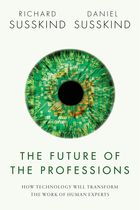By Paul Lippe
For those interested in the New Normal in law, there has been no more prolific or significant thinker in this field than Richard Susskind. Richard has long been the leading analyst and visionary around how law and legal services are changing and will change with technology.
Richard, together with his son Daniel (a lecturer in economics at Oxford) has just published a new book, The Future of the Professions: How Technology Will Transform the Work of Human Experts.
For my money, this is the best of Richard’s books, situating the changes facing the legal profession in both the long history of professions generally and the parallel challenges facing other fields such as medicine, accountancy, architecture, journalists, clergy and teaching.

Image from Oxford University Press.
Richard and Daniel begin by describing the implicit “Grand Bargain” between the professions and society, whereby the professions retained many of the protections (including, perhaps most importantly self-regulation) of the medieval guilds. Professions can define the appropriate nature of their service, the credentials needed to offer it, and enjoy reasonably high prestige and income. In exchange, professionals are expected to maintain their expertise, act honestly and in good faith, and put the interests of clients ahead of their own.
But the Grand Bargain has broken down in at least two ways for law. First, because lawyers have been slow to accept that knowledge about the means needed to deliver services is a necessary concomitant to subject matter expertise. Second, because lawyers are widely perceived as maximizing their own income at least independent from, if not divergent to, the interests of clients. More broadly, professions have seen a breakdown in the traditional information asymmetry, as when clinicians are confronted with patients armed with WebMD printouts on one hand and insurance companies specifying reimbursable procedures on the other. So will we see a New Deal replace the Grand Bargain?
In less formally professional fields there has already been widespread disruption catalyzed by technology. For example, Google and Facebook have displaced much of the newsgathering and curation roles of journalists, with an even bigger impact on local papers than the leaders like the New York Times or the Financial Times. If journalism were as strictly regulated as law, perhaps the traditional newspapers could have blocked the rise of new forms of service.
The Susskinds identify key trends that will force the redefinition of professionals’ roles:
• The relative unaffordability and lack of reach of professional services in today’s delivery model.
• The rise of the empowered consumer who feels capable of judging the nature and quality of professional service, coupled with the general reluctance of professionals to embrace technologies to enable expertise to scale.
• The empowerment to be gained by from grappling with problems oneself, rather than assigning agency to a professional.
• The advent of ever more capable technology that creates a “moral” obligation to facilitate access to the benefits professions can bring.
The sum of these trends is that “the end of the professional era is characterized by … the move from bespoke service; the bypassing of traditional gatekeepers; a shift from reactive to proactive approach to professional work; and the more-for-less challenge.”
The Susskinds acknowledge that the common response of most professionals will be to dismiss these trends as “blips.” Instead, the Susskinds suggest these challenges can’t be dealt with in isolation, but represent a systemic problem. I might put it a little differently—all the interesting problems are cross-disciplinary and client-specific, but the instinct of most professionals is to stay within their comfort zone—their discrete area of expertise—neither thinking cross-functionally nor fully comprehending the client. Or, as the Susskinds quote physics Nobel laureate Richard Feynman: “If we look at a glass of wine closely enough we see the entire universe … If our small minds, for some convenience, divide the glass of wine, this universe into parts—physics, biology, geology, astronomy, psychology and so on—remember that nature does not know it!”
But despite a somewhat critical view of today’s professionals, the Susskinds take a fundamentally optimistic view of the future for law as well as other fields—both the utility of law to society and the utility of and rewards to lawyers. In particular, the Susskinds prefer to avoid the term “disruption,” because they see the trends around technology substitution as innovative and liberating to the consumers of professional services. Lawyers will enjoy new flexibility and skills development and mastery, and the satisfaction of meeting heretofore unmet needs. The broad trend will be “demystification,” and the critical skill the ability to manage data.
The Future of The Professions is an especially useful book for lawyers, because it encourages us to think outside ourselves—both to see the parallels in other fields and to imagine a different future. In the end, it comes down to a simple question: Do we imagine that the future of the (legal and other) professions is to be ever more unique and unlike what else is happening in society and work, or do we imagine that the future of law is to be more like what else is happening in society and work?
Or, as the Susskinds put it: “The professions should survive and prosper because they bring values and benefits that no system or tool can.” To do that, we have to both understand and take the best from the New Normal, and refresh the Grand Bargain through our commitment to being the best profession we can be.
Paul Lippe is the CEO of the Legal OnRamp, a Silicon Valley-based initiative founded in cooperation with Cisco Systems to improve legal quality and efficiency through collaboration, automation and process re-engineering.
Editor’s note: The New Normal is an ongoing discussion between Paul Lippe, the CEO of Legal OnRamp, Patrick Lamb, founding member of Valorem Law Group and their guests. New Normal contributors spend a lot of time thinking, writing and speaking about the changes occurring in the delivery of legal services. You’re invited to join their discussion.